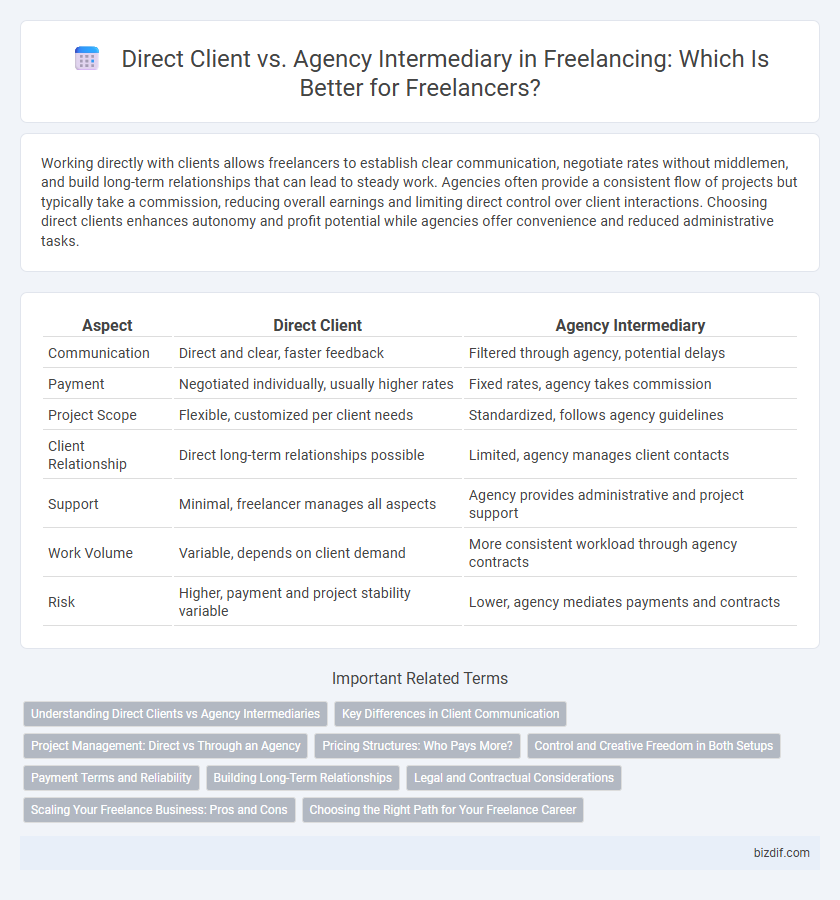Working directly with clients allows freelancers to establish clear communication, negotiate rates without middlemen, and build long-term relationships that can lead to steady work. Agencies often provide a consistent flow of projects but typically take a commission, reducing overall earnings and limiting direct control over client interactions. Choosing direct clients enhances autonomy and profit potential while agencies offer convenience and reduced administrative tasks.
Table of Comparison
| Aspect | Direct Client | Agency Intermediary |
|---|---|---|
| Communication | Direct and clear, faster feedback | Filtered through agency, potential delays |
| Payment | Negotiated individually, usually higher rates | Fixed rates, agency takes commission |
| Project Scope | Flexible, customized per client needs | Standardized, follows agency guidelines |
| Client Relationship | Direct long-term relationships possible | Limited, agency manages client contacts |
| Support | Minimal, freelancer manages all aspects | Agency provides administrative and project support |
| Work Volume | Variable, depends on client demand | More consistent workload through agency contracts |
| Risk | Higher, payment and project stability variable | Lower, agency mediates payments and contracts |
Understanding Direct Clients vs Agency Intermediaries
Direct clients offer freelancers clearer communication, higher payment rates, and more control over project scope, fostering stronger professional relationships. Agency intermediaries provide consistent project flow, reduced client acquisition effort, and access to diverse job opportunities but typically charge a commission, affecting overall earnings. Evaluating the trade-offs between direct client engagement and agency partnerships is essential for optimizing freelancing income and workload management.
Key Differences in Client Communication
Direct client communication in freelancing enables clearer, faster feedback and personalized project alignment, fostering stronger professional relationships. Agency intermediaries often create communication layers that can delay responses and dilute client requirements, impacting project efficiency. Freelancers working directly with clients benefit from increased transparency and control, while agencies provide structured processes and multiple points of contact for complex projects.
Project Management: Direct vs Through an Agency
Managing projects directly with clients enables freelancers to maintain clear communication and receive immediate feedback, resulting in faster decision-making and tailored solutions. Agencies often provide structured project management processes and resources, but may introduce delays and diluted communication due to multiple layers of coordination. Freelancers weighing direct client work versus agency collaboration should consider the trade-offs between autonomy and support systems in project execution.
Pricing Structures: Who Pays More?
Direct clients typically offer higher rates as freelancers avoid agency fees, which can range from 10% to 30% deducted by intermediaries. Agencies provide consistent work and handle client acquisition but often pay freelancers less due to these overhead costs. Freelancers working with direct clients generally retain more earnings per project, making it a more lucrative pricing structure.
Control and Creative Freedom in Both Setups
Direct client relationships offer freelancers greater control over project scope, deadlines, and creative decisions, enabling personalized communication and flexibility. Agency intermediaries often impose structured workflows and client requirements, limiting creative freedom but providing a consistent pipeline of work and administrative support. Balancing creative autonomy with operational control depends on the freelancer's preference for independence versus stability in project management.
Payment Terms and Reliability
Direct client contracts typically offer clearer payment terms with faster settlements, reducing delays common in agency-mediated projects. Agencies often provide consistent workflows but may impose longer payment cycles and deduct commissions, affecting freelancers' cash flow reliability. Freelancers seeking timely payments and transparent conditions generally prefer direct client engagements over agency intermediaries.
Building Long-Term Relationships
Direct client freelancing fosters deeper trust and clearer communication, enabling freelancers to tailor services precisely to client needs and secure consistent projects. Agencies act as intermediaries but often limit personal interaction, which can hinder the development of strong, long-term rapport. Prioritizing direct engagements enhances client loyalty and promotes sustained business growth through reliable, personalized partnerships.
Legal and Contractual Considerations
Direct client engagements often provide freelancers with clearer legal and contractual terms, reducing ambiguity in payment schedules, intellectual property rights, and project scope. Agency intermediaries may introduce complex agreements, including commission structures and non-disclosure clauses, which require careful review to protect freelancers' rights and financial interests. Understanding jurisdiction-specific labor laws and contract enforcement mechanisms is crucial when negotiating with either direct clients or agencies to ensure compliance and dispute resolution efficacy.
Scaling Your Freelance Business: Pros and Cons
Working directly with clients offers higher profit margins and personalized communication, enabling freelancers to build strong relationships and tailor services. Agency intermediaries provide a steady flow of projects and reduce marketing efforts but often take a significant commission and limit direct client interaction. Balancing both approaches can help scale a freelance business by combining consistent workload with opportunities for brand building and higher earnings.
Choosing the Right Path for Your Freelance Career
Direct clients offer freelancers higher profit margins and closer relationships, enabling better control over project scope and communication. Agencies provide a steady workflow and reduce client acquisition time but may take a commission fee that lowers overall earnings. Evaluating personal work style, desired income stability, and networking skills is crucial when choosing between direct client engagements and agency intermediaries in freelancing.
Direct client vs Agency intermediary Infographic

 bizdif.com
bizdif.com